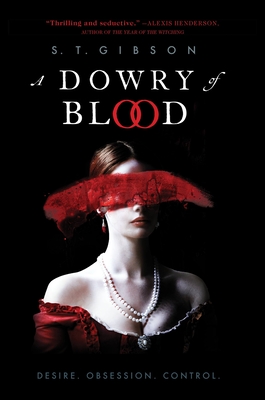
S.T. Gibson’s A Dowry of Blood is an intimate and lyrical retelling of Dracula’s story through the eyes of his first bride, Constanta. Written as a confessional letter to her immortal husband, this novel reimagines the classic vampire myth not through fangs and fright but through the intoxicating language of obsession, control, and liberation.
Constanta begins as a dying peasant, saved and reborn by a mysterious stranger who offers her eternal life and eternal devotion. What follows is a centuries-long descent into love’s darkest corners. When new consorts Magdalena, the elegant aristocrat, and Alexi, the passionate young artist join their unholy union, Constanta’s world begins to fracture. As she grows closer to her companions, she starts to see her husband for what he truly is: a manipulative predator whose love feeds on submission.
One of the book’s greatest strengths is its voice. Told entirely as a letter from Constanta to Dracula, every line feels achingly personal and raw. Robin’s review captures this beautifully, calling it “an exquisite reimagining of Dracula’s Brides” and praising Gibson’s poetic prose that “chronicl[es] the quiet descent from love into violence over many years.” Indeed, Gibson’s language is mesmerizing romantic, gothic, and filled with yearning that teeters between devotion and despair.
But the novel isn’t without its critics. Some readers, like Aneta, found it hollow, describing it as “a soulless summary of events instead of actual plot.” She raises a fair point: while the prose enchants, the story itself often drifts without momentum. The worldbuilding is light, the pacing languid, and the relationships particularly the tangled dynamic between Constanta, Magdalena, and Alexi can at times feel more symbolic than sensual.
Others, like Zainab Qadeer, felt frustrated by the repetitive cycle of seduction and control. She describes the story as one where “they had their fun until they grew bored,” highlighting how the emotional and physical entanglements begin to blur rather than build. Still, even critics of the novel agree on one thing: Gibson’s prose is undeniably gorgeous. Her words have the rhythm of an incantation, her imagery rich and dripping with gothic beauty.
What A Dowry of Blood ultimately achieves is more emotional than narrative. It’s not about the shock of horror or the thrill of plot twists it’s about the suffocating intimacy of a toxic relationship. It’s a love story that unravels itself from the inside out, a meditation on freedom, power, and the courage it takes to break the chains of an immortal abuser.
Constanta’s final act of defiance slaying the man who made her feels both devastating and triumphant. In killing Dracula, she reclaims her voice, her will, and her name. It is not a love story, as Zainab wisely reminds us, but rather the story of surviving love’s most monstrous form.
For readers who crave lush prose, queer undertones, and psychological depth, A Dowry of Blood is a gothic feast. But for those seeking fast-paced horror or traditional vampire thrills, this might feel more like a fever dream than a fanged nightmare.
A darkly romantic tale of liberation, A Dowry of Blood lingers like a whispered confession you can’t forget.
👉 Purchase your copy here: Buy on Amazon


